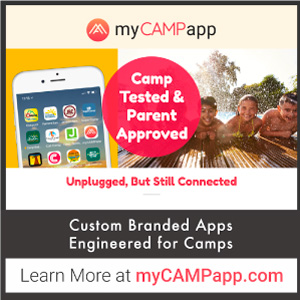Running a summer camp is no easy feat. Demands on camp administrators are unrelenting. Attention gets divided among children, staff, budgets, supplies, transportation, and other operational logistics. Factor in parents’ insatiable appetite for photos, videos, and updates (but lack of attention to emails), and you surely know firsthand why camps are struggling to keep everyone in sync.
In fact, an American Camp Association survey identified “parent communication” as one of the top issues facing camps.
With resources spread thin, camps need a better way. Could mobile technology be the answer to ease the communication strain stress? The short answer is yes!
But if you are thinking about getting a mobile app for your camp, read this first.
Why an App and How Does it Help?
It is a fact: apps are becoming a popular and effective tool for camps to keep parents informed. But why and how?
Why
Mobile is without a doubt one of the most disruptive technologies for businesses in decades. In fact, not since the advent of the internet has a technology forced businesses to completely rethink how they win, serve, and retain customers. We now live in a world of immediate gratification. Mobile technology has groomed us to expect access to what we want, when we want it. This is called the “mobile mind shift” — and 99 percent of your campers’ parents have adopted it.
However, not all apps have value. In fact, more than 90 percent of all downloaded apps are used once and then deleted (Varshneya, n.d.). The most common reasons for axing apps are poor performance (slow loading, recurring crashes, etc.) and lack of relevant content.
Apps are used and loved when they do one or more of the following:
- Make life easier
- Streamline communications
- Provide needed solutions
- Connect groups or communities
- Offer entertainment value
For a camp app, the main benefit is a streamlining of communication. In addition to providing an efficient way to connect, it will make life easier for both parents and staff.
Imagine providing parents all the camp information they need, easily accessible at their moment of need, right at their fingertips on their phones. Better-informed parents result in fewer calls to the office, timely paperwork submissions, and happy campers who actually show up with their superhero costumes on Superhero Day! Through their app, camps can also make parents feel more connected while their children are at camp by sharing photos, camp news, date reminders, and more.
For many camps, remaining top of mind in between camp sessions is key for retention. Sharing camp memories, alumni events, parenting tips, and even teasers about next summer’s programming via their app is one of the ways camps can add value and stay connected throughout the year.
In short, a camp app can help you create a positive and more engaging experience for parents before, during, and after camp. It can foster deeper connections and nurture lasting affinity. An app could allow your camp to be more parent-centric, improve satisfaction, and increase retention.
How
Think about offering an expanded experience that extends beyond a child’s time at camp and into the family room.
Laurie Browne, PhD, director of research at the American Camp Association, talks about three classic parent/caregiver types with distinct needs or expectations, roughly summarized as follows (Browne, 2019):
- Parents/caregivers who are nostalgic and avid advocates of traditional camp will value feeling connected to your camp culture.
- Parents/caregivers who want their children to partake in any and many enrichment programs will value seeing all the activities available at your camp.
- Parents/caregivers who just wants their kids to have fun, be safe, and avoid any scheduling headaches will value a stress-free process.
All these parent types will find great value in a camp app that keeps them engaged, informed, and organized.
Here are five tips on how you can achieve this with your camp app:
1. Personalized experiences: Apps are popular because you can customize your experience. You should be able to tailor your app content to each app user. When people get information they want, they pay attention and they stay engaged.
2. Reminders, updates, and alerts: So many things going on before and during camp — parents lose track. Deadlines are missed, paperwork is late, and little Kylie has left her Wonder Woman costume at home on Superhero Day — disaster! Your app should include a system to send push notifications.
3. Say “cheese!” Everyone loves to browse and share photos from their mobile phones. This is a must-have feature for your camp’s app. Parents should be able to view, save, and share camp photos right from your app.
4. What, when, and where? Publish your camp calendar in your app. Let parents, campers, and staff easily access your latest schedule of activities, lunch menus, bus routes, etc. — anytime, anywhere.
5. “Hello, Houston.” If a parent needs to email the camp director or call about attendance, make it easy. One-touch call and email links in the app allow parents to reach the right staff member every time.
These features will help your camp give parents the satisfaction of knowing their kids are not only having great fun in a safe environment, but also learning enduring lessons in community, character-building,
What Are the Options?
Two options are available for getting your camp an app:
- software as a service and
- custom development.
Software as a Service
This is a very popular and business-friendly model. Software as a service (SaaS) is a software licensing model in which access to the software is provided on a subscription basis. This allows sophisticated software solutions to be available to smaller organizations at an affordable rate.
You’ll need to research existing providers and then compare the pros and cons of each of their services to best match your specific needs and budget. Look for a turnkey solution that is intuitive and easy to use day-to-day.
Custom Development
If you have time, a large budget, and extra bandwidth, you might want to consider a custom-built app. This can be an exciting process as you get to build exactly what you want — but be cautious of the all too common potential pitfalls. You’ll need to work with an experienced and trustworthy developer or development company.
Here is the basic process of developing an app:
- Begin the discovery phase with the development team — share your vision and interview the team for the job (see the next section, “Ask the Right Questions,” for additional information).
- Define and refine app specs and minimum viable product (MVP) features.
- Create wireframes (blueprints) and user experience flow.
- Design mockups with branding.
- Begin “sprints” of software development and quality assurance.
- Beta release to a control group of users defined by the client for final testing and tweaks.
- Publish the app to Google Play and the Apple App Store. Note that Apple requires app owners to create their own Apple Developer account, and the process can take anywhere from two days to two months.
- Developer keeps track of bugs reported by users, enhancements requested by the client, and required software updates.
- Publish regular updates for your iOS and Android apps.
Ask the Right Questions
Even if you are not techie, you can make an educated decision about your camp’s next mobile app if you ask the right questions. Although the following list of questions is targeted at custom app development, you can also use many of them when researching your SaaS platform.
Ten questions to ask your app developer:
1. What experience do you have working with camps? It is important that your developer has some basic understanding of your industry and is willing to invest the necessary resources to learn more about your business. You want them to be able to act as consultants rather than order takers.
2. Can we see examples of apps you’ve developed with features similar to the ones we need? They should be able to send you links to apps they developed on the app store. Make sure to ask if the current version of the app is their work.
3. Can we have a list of and contact your past and current clients? Naturally, you’ll want referrals. Find out how responsive the developer was to their needs during the development process and after the app launched. Ask about any problems they encountered and how the developer handled them.
4. How do you intend to integrate our camp’s look and feel? It’s important for your app to look like your brand.
5. Can you explain your development process? Depending on whether you are working with a custom app or SaaS app, the process will vary. Make sure they have professional, dedicated quality assurance as part of the process.
6. Can you create “native” apps for us? If you are doing a custom build, we recommend that you request native apps — application programs that have been developed for use on a particular platform or device — using the standard and universally adopted programming languages for Apple and Google.
7. Will we be able to create and edit content ourselves? Find out if you will you have total control to make content changes, or will you need to go through the developer with special requests?
8. Will you support and drive updates? Apps require updates all the time. For example, apps must be updated when Apple and/or Google make changes to their operating systems, or when a third-party library is updated, and, of course, when you want functionality enhancements. Your developer should support and drive the maintenance of your app. Your app will need to be updated to remain useable.
9. Do you offer tech support for your staff and users? Who can you go to with questions or for assistance with technical glitches?
10. Will you provide in-app analytics and share reports with our key performance indicators? You need to know if your app is helping your business.
Beyond the App
Your app is on Google Play and the Apple App Store — now what? Like anything else you’ll need to promote your camp app to drive adoption by parents. Your app should be integrated into your marketing ecosystem. Here are some basic guidelines:
- Promote your app on your website home page.
- Tease the launch of your app with a countdown.
- Showcase screenshots of your app.
- Add links to your app in all your emails.
- Tease your app on all social media channels.
- Create a quick install guide flyer.
Once the app is installed, mobile push notifications, at least weekly, are key to drive engagement and increase satisfaction.
Last Words
Yes, apps can be a game changer for camps.
An app can help you level up to the expectations of the next generation of parents and staff too. Although it may require an adjustment for some of your staff to use a new platform for communication, others will embrace it right away. Same with parents. That is natural. So, stick to it. Your app could be an opportunity to not only reduce the communication strain, but also to nurture a deeper positive connection between parents and camps — returning value on your investment many times over.
Alex and Ron Linyard are co-founders of 1218 App Team.
Ron Linyard leads software engineering, research and development, and intellectual property matters for the company. A California native, Ron earned his master’s degree in Computer Science and Artificial Intelligence from The Johns Hopkins University.
Alex drives business development and is the chief “client success” officer. Born in France, Alex came to the US as a teenager. She earned her MBA from Florida International University. For more information, contact [email protected].
References
Browne, L. (2019, July 8). Can’t Get No Satisfaction: A better way to get useful feedback from parents and caregivers, part 1. American Camp Association. Retrieved from ACAcamps.org/news-publications/blogs/research-360/cant-get-no-satisfaction-better-way-get-useful-feedback-parents-caregivers-part-1
Varshneya, R. (n.d.). 7 reasons why users delete your mobile app. Inc.com. Retrieved from inc.com/rahul-varshneya/7-reasons-why-users-delete-your-mobile-app.




